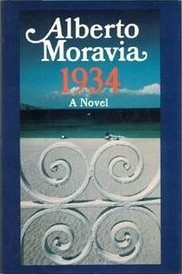What do you think?
Rate this book


Moravia's political fable about an Italian anti-Fascist and the frightened, suicide-seeking German girl he encounters on a boat to Capri--the setting of Moravia's Il disprezzo from 1954--was welcomed as one of his finest novels. Stephen Spender for The New York Review of Books commented: "One of the most brilliant strokes in this novel about relations in the Thirties between Italians and Germans is that Moravia never reveals whether his Italian narrator and hero is serious or not, and doubt about the seriousness lies in his being Italian. ... This is the truth of the book: that within the external situation of the Italian Fascist--German Nazi relationship it is impossible to accept as authentic virtually anything people do."
Moravia is not simply painting the portrait of an age but also coming to grips through his art with the great questions of all ages - the erotic, love, death, and the purpose of life. 1934 recapitulates the major themes of his art and at the same time takes us beyond them.
297 pages, Hardcover
First published January 1, 1982
